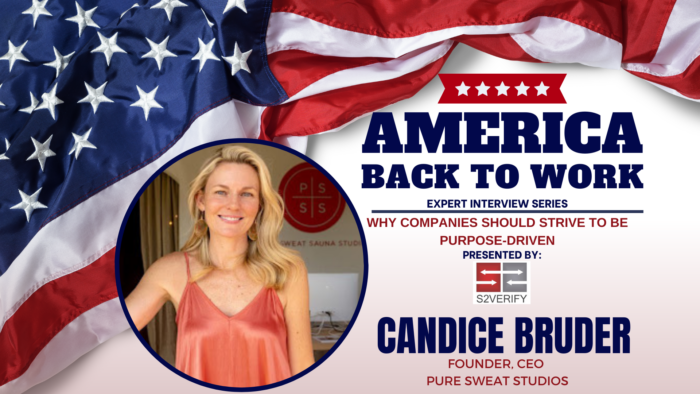Join America Back to Work, a weekly podcast, video, and blog series that covers timely and relevant topics affecting the labor market and workforce with industry experts. The series includes recruiting, hiring, retention, employee satisfaction, customer service, background screenings, and more.

America Back to Work: Candice Bruder, Pure Sweat Studios
Cultivating Purpose-Driven Teams
In this week’s episode of America Back to Work, host Arnette Heintze welcomes Candice Bruder, founder of Pure Sweat Studios, a wellness company specializing in infrared sauna and float therapy.
Candice shares her insights on aligning company culture with recruitment and retention strategies, drawing from her extensive experience fostering a purpose-driven business environment.
What You’ll Learn
- Company Culture and Brand Values: Discover how Candice integrates her brand’s core values into every aspect of her business operations, from customer service to internal team interactions.
- Recruitment Strategies: Learn about the techniques Candice uses to ensure new hires are skilled and align with the company’s mission and culture. She emphasizes the importance of “people people” candidates and how personality plays a critical role in their hiring process.
- Employee Engagement and Retention: Gain insights into how Pure Sweat Studios maintains high employee engagement and retention rates by deeply embedding its mission and values into its operational practices.
- Handling Growth and Diversity: Candice discusses the challenges and strategies of managing a growing business while catering to a diverse clientele and workforce, including different generational needs.
Episode Highlights
- Mission-Driven Business: Candice elaborates on how having a clear mission statement and brand values has shaped her business and team dynamics.
- The Role of Cleaning: A unique take on how even the most mundane tasks can reflect company values and contribute to a larger purpose.
- Inclusive Leadership: Tips on engaging team members in decision-making processes and the importance of being both an instructor and a coach.
America Back to Work: Watch the Video Now
America Back to Work: Listen to the Podcast Now
About America Back to Work
Subscribe to America Back to Work in your favorite podcast player so you don’t miss an episode. You can do that by clicking here.
S2Verify is one of the leading, privately held, pre-employment background screening companies in the United States.
Arnette Heintze is co-founder and chief strategy officer at S2Verify. Before establishing S2Verify, Arnette spent more than three decades working at the highest levels of federal, state, and local law enforcement.
He served more than 20 years in the United States Secret Service as a special agent and senior executive where he planned, designed, and implemented security strategies to protect U.S. Presidents, world leaders, events of national significance, and our nation’s most sensitive assets, including financial infrastructure.
After retiring from the Secret Service, Arnette focused on building the growth and performance of innovative start-ups and SMBs. In 2004, he established Hillard Heintze, a globally recognized strategic security risk management and investigations firm.
In 2009, along with Bill Whitford and Jim Zimbardi, Arnette established S2 Verify with an approach and methodology that delivers fast, accurate, compliant, and affordable background screening insights crucial to better managing insider risks, threats, and vulnerabilities.